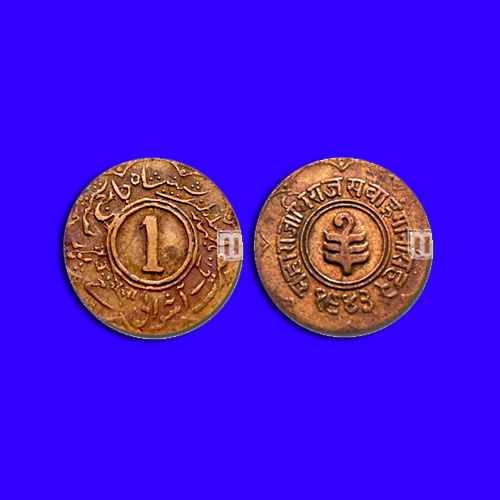Jhar on Coin
2021-05-25 Tue
The obverse on the coin states, “Jhar within the doubled circle, Maharajadhiraja Sawai Man Singh 2 in Devanagari, Date below” and the reverse side of the coin says, “Numeral 1 within the doubled circle, Mint name in Urdu Legend, Value”.The Maharajas of Jaipur traced their roots to the kacchwaha clan of Rajputs who claimed to be descendent of Hindu God Rama. After the collapse of the Mughal Empire, Jaipur witnessed internal conflicts with Jats, Marathas, other Rajput states, Pindaris, and the British. From 1818, it entered into the subsidiary alliance system with the British. During the Revolt of 1857, Maharaja decided to remain loyal to the British and sent military forces to assist the British to suppress the uprising in other places. Jaipur was incorporated into the Union of India in 1948 and later became the capital of Rajasthan state.
The Jaipur Kingdom, also called the Kingdom of Amber or Dhudar, was established by Dulaha Raya in 957 AD. After Jahangir’s death, Jodha Bai gave Amber kingdom to Jai Singh I who was the nephew of Maan Singh. He served Aurangzeb and received the highest dignities from the empire. He was also made a commander of 4000 by Shah Jahan and led the war against Southern Sultanates. The same army was sent to lodge a war against the Gond kingdom. Because of the successful ventures led by Jai Singh, he was promoted to the rank of 5000 and the Chatsu district was added to his Amber kingdom. He expanded his rule in the north too by defeating Meo robbers of that area.
Image Courtesy: Mintage World
Latest News
-
Ghiyath Shah as Heir Apparent
2025-09-25 ThuGhiyath Shah was the ruler of the Malwa Sultanate, reigning from 1456 to 1500. From 1456 to 1469, he...
-
Malwa Sultan Mahmud Shah Silver Coins
2025-09-11 ThuMalwa Sultan Mahmud Shah minted silver coins in round and square flans. <br><br> For round coins,...
-
Malwa Sultan Mahmud Shah Billon coin
2025-08-26 TueMalwa Sultan Mahmud Shah's billon coins followed three weight standards: 100 rati, 96 rati, and 80 r...
-
Fascinating Archaeological Facts on Postage Stamps - 91
2025-08-23 SatRhinoceros is one of the oldest land mammal species existing in India. There are five species of rhi...
-
Fascinating Archaeological Facts on Postage Stamps - 90
2025-08-23 SatUthiramerur, a Village in Kanchipuram, Tamil Nadu, is notable for its Temple inscriptions that descr...

